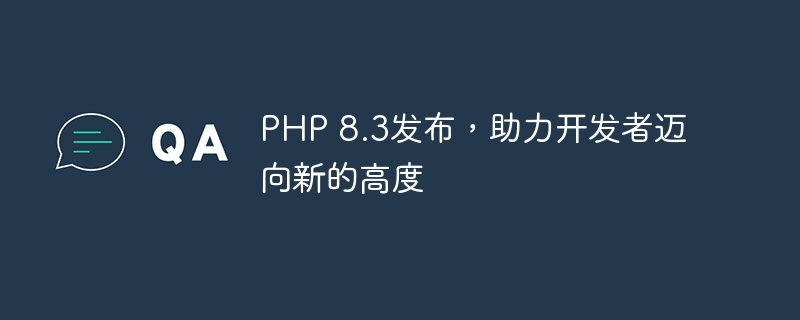Home >Backend Development >PHP Tutorial >PHP 8.3 released, helping developers reach new heights
PHP 8.3 released, helping developers reach new heights
- WBOYWBOYWBOYWBOYWBOYWBOYWBOYWBOYWBOYWBOYWBOYWBOYWBOriginal
- 2023-11-27 12:59:03763browse

Recently, the PHP development team announced the release of a new PHP 8.3 version, which is expected to bring developers a more efficient and powerful development experience. As the world's most popular server-side scripting language, PHP is constantly evolving and improving to meet the ever-changing needs of the Internet. The release of PHP 8.3 is not just a version update, but also means the continuous growth and progress of the PHP ecosystem.
First of all, PHP 8.3 version will bring better performance and efficiency. In pre-release testing, PHP 8.3 has significantly improved performance compared to previous versions. By optimizing the underlying engine and adding new features, PHP 8.3 can handle requests more efficiently and has significant improvements in execution speed. This means developers can develop stable and efficient applications faster and provide users with a better experience.
Secondly, PHP 8.3 will introduce many new functions and features. The most eye-catching one is the introduction of JIT compiler (Just-In-Time Compiler) technology, which can convert PHP code into machine code, thus improving execution speed. In addition, PHP 8.3 also adds new native type syntax, new functions that receive parameters of different types at the same time, improved support for asynchronous programming, and more. These new features will make developers more flexible and efficient during the development process, allowing them to organize and manage code in a better way.
At the same time, PHP 8.3 also improves the language’s error handling mechanism and optimizes exception handling. In previous versions, PHP would generate fatal errors for uncaught exceptions, causing the application to terminate. In PHP 8.3, developers can better control and manage exceptions through the new exception handling mechanism to avoid unexpected termination of applications. This will be a very important improvement for developers developing large applications and complex systems.
In addition, PHP 8.3 also provides plans to deprecate and remove some obsolete features. This is to drive developers to more actively use new features and best practices while reducing inefficient and outdated code. This is very important to keep the PHP ecosystem healthy and growing, and also helps keep PHP-developed applications efficient and stable.
In general, the release of PHP 8.3 will bring developers a more efficient and powerful development experience. Whether it is performance improvements or improvements in new features and optimizations, developers will be able to develop high-quality applications faster. At the same time, the release of PHP 8.3 also represents the continuous growth and progress of the PHP ecosystem, providing developers with more possibilities and choices.
However, it is worth noting that upgrading to PHP 8.3 is not a simple matter. Since some PHP code from older versions may be incompatible with newer versions, developers may need to modify and adjust their code to adapt to the new syntax and features. Therefore, before upgrading, developers need to conduct comprehensive testing and evaluation to ensure the compatibility and stability of the application.
In short, the release of PHP 8.3 will bring developers a more efficient and powerful development experience. Whether it is performance improvements or the introduction of new features and improvements, developers will be able to better develop high-quality applications. The release of PHP 8.3 is not just a version update, but also a reflection of the continuous growth and progress of the PHP ecosystem, providing strong support for developers to move to new heights.
The above is the detailed content of PHP 8.3 released, helping developers reach new heights. For more information, please follow other related articles on the PHP Chinese website!

